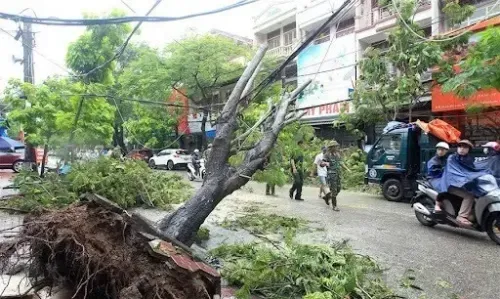Impact of Slowing Antarctic Circumpolar Current on Climate

Synopsis
Key Takeaways
- ACC slowing could lead to rising sea levels.
- Freshwater influx affects ocean density and circulation.
- Invasive species may threaten Antarctic ecosystems.
- Global warming targets may already be breached.
- Concerted efforts are needed to reduce carbon emissions.
Sydney, March 3 (NationPress) The Antarctic Circumpolar Current (ACC), recognized as the strongest ocean current on the planet, is experiencing a slowdown due to the melting Antarctic ice sheets. This phenomenon could result in rising sea levels and warmer ocean waters, significantly affecting the ecosystem for marine life, including species like Antarctic penguins, according to a study released on Monday.
The ACC is over four times more powerful than the Gulf Stream and plays an essential role in the global ocean conveyor belt that circulates water worldwide. This current connects the Atlantic, Pacific, and Indian Oceans, serving as the primary mechanism for the transfer of heat, carbon dioxide, chemicals, and biological materials among these ocean basins.
Researchers from the University of Melbourne and NORCE Norway Research Centre have reported that the current is projected to slow by approximately 20 percent by 2050 under a high carbon emissions scenario.
The introduction of fresh water into the Southern Ocean, driven by melting Antarctic ice, is anticipated to alter the ocean's characteristics, such as density and salinity, as well as its circulation patterns. A study published in Environmental Research Letters indicates that the effects of ice melting and ocean warming on the ACC are more intricate than earlier assumptions.
The research team conducted a high-resolution simulation of ocean and sea ice dynamics, investigating factors like temperature changes, salinity, and wind conditions.
According to Bishakhdatta Gayen, a fluid mechanist at the University of Melbourne, if the current's 'engine' fails, it could lead to severe consequences, including increased climate variability with heightened extremes in specific areas, and hastened global warming due to diminished capacity of the ocean to function as a carbon sink.
The ACC also acts as a barrier to invasive species, such as rafts of southern bull kelp or marine organisms like shrimp and mollusks from other continents, preventing them from reaching Antarctica. The study highlights that a slowdown and weakening of the ACC increases the chances of these species infiltrating the delicate Antarctic ecosystem, potentially disrupting the food web and altering the diet available for Antarctic penguins.
The research utilized Australia's fastest supercomputer and climate simulator, GADI, with a team from the University of New South Wales observing that the movement of ocean water from the surface to deeper layers may also decelerate in the future, as reported by Xinhua.
Taimoor Sohail, a climate scientist at the University of Melbourne, noted that many experts believe the 1.5-degree target, established in the 2015 Paris Agreement to limit temperature rises compared to pre-industrial levels, has already been surpassed, leading to expectations of increased heat and subsequent impacts on Antarctic ice melting.
Sohail urged for unified global efforts to curb warming by reducing carbon emissions to mitigate Antarctic ice melting and prevent the anticipated slowdown of the ACC.









